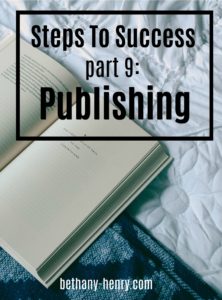So you’ve written your book. Good for you!! Cue fireworks! Celebrations! Accolades of all kinds! This is a huge deal, my friend.
After all the excitement dies down, you may find yourself asking, “So… now what?”
Just as there are many different writing styles and methods, there are many different options when it comes to publishing and sharing our work. Today we’ll look at a few options on what to do with our stories once we’ve finished them.

This post is Part 9 of the Steps to Success series designed to walk us through the process of writing a novel from beginning to end. As always, personal preferences and experiences differ. This guide is based in part on my own experiences as well as from authors I have worked with and/or learned from along the way.
Find steps 1-8 here:
- Getting Started (where we look at our goals for writing and find our starting point)
- Developing Content (where we dig a bit deeper into what story we want to tell)
- Creating an Outline (where we brainstorm the basic structure of our story)
- The First Draft (where we get our writing plans in place and start our story)
- Rest (where we set our writing aside to breathe)
- Revising Our Writing (where we look at the revision process)
- Beta Reading (where we get feedback on our writing)
- Editing (where we look into editing our work)
If you haven’t looked at the earlier steps in this series yet, I would encourage you do so. Our work should be as polished and finished as possible before we publish it!
Getting Published
To start off with, you don’t need to publish your novel if you don’t want to. That’s a perfectly acceptable decision and doesn’t make you less of a “writer.” Being published doesn’t mean anything magical in and of itself.
If you write then you are a “writer.” You are meaningful, important, and spectacular whether or not you are published.
Publishing may not be for everyone. Getting a book published can mean a lot of headaches and work, so why borrow the trouble?
It really depends on your personal motivation and goals.
If your goal for writing is to hand the story to your neighbor, child, or friend for them to enjoy- all power to you. You don’t need to be published in order to achieve that goal.
However, some writers very much want to be published. Reasons are endless, including wanting to make money, wanting to be formally recognized, and wanting to share their story with a larger audience.
It’s worth thinking through our motivations for writing so that our goals can guide our publishing decisions.

3 Publishing Options Pros and Cons
1. Not Publishing
This options is ideal for personal projects, family stories, etc, and for writers who aren’t looking for recognition or financial gain through publishing.
Sharing our work without publishing it is exactly what it sounds like: we bypasses the complications of publishing completely by sharing our work with others on our own. We can email a PDF to friends, we can put our book on our blog, and we can get a bound copy printed at the copy shop for our bookshelf.
Pros
-Fairly immediate results. We can finish our writing and immediately send it to anyone we want.
-Low hassel. We don’t need to deal with rejection letters or deadlines. We control the process completely.
-Low Cost. Because we control the process of how we share our book, we can limit how much we spend for printing, design, etc. We may also have a smaller audience so that keeps our costs down as well.
-Decent quality product. There are many companies who will print and bind books on demand so our novel doesn’t need to look like we’re back in grade school (unless that’s what we’re going for). We can even get connected with artists to design cover art and more.
-This is an overall simple way to share our writing with those closest to us.
Cons
-Low credibility due to not officially published. A non published book will be seen as amature art and is unlikely to help us be seen as an authority in our field.
-Low shareability. Non published books won’t be sold in bookstores or on Amazon, for instance, so this limits our audience to those we personally know.
-Lack of revenue. Non published books won’t make money since they won’t be sold in stores.
-Later difficulty publishing shared work. Publishers are looking for original and unique work, they don’t want something that’s already been shared on our blog or emailed to everyone we know. If we we’re thinking we may want to publish our story later we should be careful who we share it with now.
2. Self Publishing
This option is ideal for writers whose work does not fit into traditional genres, as well as those interested in marketing and business.
Self publishing is when authors do tasks traditionally done by publishing houses (editing, formatting, marketing, etc) in order to publish their own work. This has become hugely popular in recent years and there are many resources available to assist writers through this process.
Pros
-Higher control over our work. Writers control the self publishing process so they make the decisions regarding cover art, edits, price of the book, etc.
-Increased revenue possible. Instead of a low royalty granted by a traditional publishing house, self publishers keep a much higher percentage of the books’ earnings.
-High production available. With self publishing gaining greater respect and attention in recent years, resources are available to help writers produce their own high quality books.
-Relatively short turnaround to publication. Since the author is leading the publishing process there is typically less waiting involved.
Cons
-Self publication frequently has some start up costs, such as paying for editing and formatting.
-Some stigma still in place. Many readers continue to see traditionally published books as superior to self published work, regardless of quality.
-More work involved. With greater control over the publishing process comes greater responsibility. If we want a team of people to help get our book on the market then we’ll need to find them and get them on board.
-Some business mindset required. Instead of just writing books, now we’ll be needing to get working on marketing and self- promotion.
3. Traditional publishing
This option is ideal for people whose work fits into traditional genres, those willing to work with and jump through hoops for publishers, and for those not interested in marketing and business.
Pros
-This is historically the the most recognized type of publishing, sometimes seen as an end goal in and of itself.
-There will be a publishing team to help with our book.
-No upfront costs. Publishers will pay a writer an advancement on their royalty earnings so we’ll earn some money upfront.
-Greater marketing reach. Publishers have connections to get our book in front of a larger audience, including bookstores and libraries.
Cons
-It can be hard to get connected with agent and publisher. We must be prepared for lots of queries and submissions, as well as rejections.
-Low payout. While there are no upfront costs (beware publishers who ask for money), the royalty typical for a traditionally published book is quite low.
-It takes a long time. Even after being connected with a publisher the timeline to when we see our book in print is a long one.
-Despite a publishing team, we will still need to be involved in self promoting and marketing.

So, What Publishing Option Makes Sense For You?
Depending on your story and your goals, you’ll want to think through the options available and decide what’s best for you. Feeling stumped or overwhelmed? Chat with a friend or leave a note below in the comments, I’d be happy to help out as I can. 🙂
Also know that there are many paths to success. Hard work and persistence can pay off no matter which route we choose!
So choose what seems best for you and move forward with courage!
There is a lot to navigate and unpack regarding publishing, so stay tuned for more information soon! Also, feel free to check out my Pinterest resources board for relevant articles.
Best of luck to you as you move forward toward sharing your story with the world!
No matter what you end up deciding to do with your story, I applaud and salute you. You are amazing, dear writer!
There’s a lot to consider and learn about publishing- what steps or tips did I miss? Feel free to share your experiences below!





